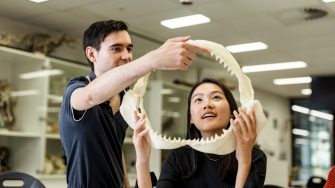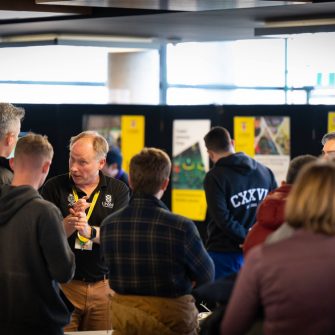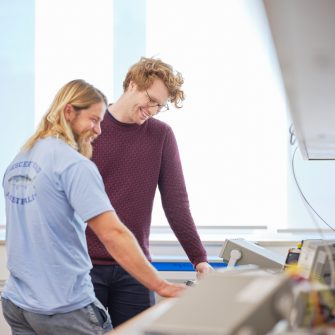Bachelor of Science (Canberra)
- Commencing Terms
- Semester 1
- Duration
- 3 Year(s)
- Delivery Mode
- Face-to-face (includes blended)
- Campus
-
Canberra
- Codes
- UAC code 450020
- Program code 4410
- CRICOS code -
-
ATAR/2025 lowest selection rank
- 75.0 View all admission criteria
-
2026 Indicative first year full fee
- $8,500*
-
2026 Indicative full fee to complete degree
- $26,000*
-
2026 Indicative first year full fee
- -
-
2026 Indicative full fee to complete degree
- -

The Australian Defence Force Academy
Combining teaching and research with military education
UNSW Canberra specialises in high-quality undergraduate and postgraduate courses in all areas relating to military, strategic and defence studies. This means future leaders of the Navy, Army and Air Force can combine their military and leadership training with our world-class university programs and defence industry expertise.
- Overview
- Entry requirements
- What will I study?
- Future careers
- How to apply
- Fees
Overview
Bring the innovation and discovery from a Bachelor of Science to address modern challenges in a career with the Australian Defence Force or private industry. Science is fundamental to Defence specialties such as technology, computers, aircraft, ships, explosives, code-making and code-breaking. Science theories and practices span industries and countries across the world, ensuring your degree positions you for professional success.
The Australian Defence Force requires leaders with sound scientific knowledge and problem-solving skills. As a Bachelor of Science graduate from UNSW Canberra, you’ll possess the intellectual and analytical skills required to be an effective leader and have broad choices about where to take your ADF career.
Key features
Study at a University that prioritises progress
UNSW Canberra aims to improve lives globally, through innovative research, transformative education and commitment to a just society. Our mission is to support lifelong learning through innovation and engagement whilst leveraging our location to build meaningful relationships across Defence, industry, government and academia.
Optional Honours year
If you excel in the Bachelor of Science, you might be eligible to complete an additional year of study and graduate with Honours. An Honours year commences after the three-year full-time Bachelor degree. The purpose of Honours is to deepen your knowledge of approaches, perspectives and traditions in your chosen scientific discipline and undertake a significant research project.
Most employable graduates
UNSW graduates are known for being career-ready with real-world expertise when they complete their degree. UNSW has been awarded Most Employable students for six years in a row (Australian Financial Review (AFR) Top100 Future Leaders Awards, 2020–2025).
Elevate your study with Launch
Launch is a collaborative workspace bringing together industry, government and university to grow innovation and capability in Defence and security. It provides the perfect opportunity to cultivate and grow your industry networks as industry, government and university work side-by-side. Launch is designed for Defence experts to come together to improve capability for Australia’s long-term Defence goals.
Why study at UNSW Canberra?
Study at a University that prioritises progress
UNSW Canberra aims to improve lives globally, through innovative research, transformative education and commitment to a just society. Our mission is to support lifelong learning through innovation and engagement whilst leveraging our location to build meaningful relationships across Defence, industry, government and academia.
Optional Honours year
If you excel in the Bachelor of Science, you might be eligible to complete an additional year of study and graduate with Honours. An Honours year commences after the three-year full-time Bachelor degree. The purpose of Honours is to deepen your knowledge of approaches, perspectives and traditions in your chosen scientific discipline and undertake a significant research project.
Elevate your study with Launch
Launch is a collaborative workspace bringing together industry, government and university to grow innovation and capability in Defence and security. It provides the perfect opportunity to cultivate and grow your industry networks as industry, government and university work side-by-side. Launch is designed for Defence experts to come together to improve capability for Australia’s long-term Defence goals.
Want to see more from UNSW Canberra at ADFA?
Entry requirements
-
- The 2025 Lowest Selection Rank (LSR) is the adjusted rank (ATAR plus adjustment factors) you would have needed to gain entry to this degree in 2025.
- The 2025 A levels score is based on four Advanced Level (A2) subjects. Entry scores are calculated from the best three or four A2 subjects (excluding repeated subjects) using the following values: A*=6, A=5, B=4, C=3, D=2, E=1. At most one Applied A Level subject may be included in the best four subjects used to calculate the aggregate.
- The 2025 IB Diploma is an indication of the IB you would have needed to gain entry to this degree in 2025. It is to be used as a guide only.
- The 2025 Lowest ATAR is the lowest ATAR (before adjustment factors were applied) to which an offer was made. Where <5 is listed, this indicates that less than 5 ATAR-based offers were made and so the score has not been published. N/A indicates no offers were made on the basis of ATAR.
*The Lowest ATAR to which an offer was made, for this program, is based on a UNSW Gateway Early Conditional Offer.
-
At UNSW, we are committed to ensuring prospective students have all the information they need in order to make informed decisions about their study options.
To assist you in gaining a better understanding of how Admissions works at UNSW, we have provided you with a summary of ATAR offers and the student profile.
We hope this information will help you identify the degree that is right for you.
Assumed knowledge
Mathematics Advanced, Physics
Adjustment Factors
We offer a range of adjustment factor schemes that reward students for academic performance and extra-curricular achievements. These schemes also take into account a range of personal and educational disadvantages that may have affected your studies.
HSC Plus
This scheme rewards students who perform well in Year 12 subjects that are relevant to their preferred UNSW degree. You may be awarded up to five points.
Elite Athletes, Performers and Leaders (EAPL)
This program recognises achievements in the areas of sport, academia, leadership and music at an elite level. You may be eligible for up to five points.
Educational Access Scheme (EAS)
Factors such as illness, financial hardship, language difficulties or attending a particular school can mean you don't always get the best possible marks in Years 11 and 12. If one of these situations applies to you, submit an application for the Educational Access Scheme (EAS) via UAC. Eligible students can receive between 1 and 10 points towards their chosen UNSW degree.
Admission pathways
Your ATAR is not the only measure of your potential to succeed, which is why we offer a range of pathways into university. Explore your options below and get in touch with our Future Student Advisers to discuss your path to UNSW.
Gateway Admission Pathway
This scheme is open to students who attend Gateway schools, live in a low-socioeconomic area based on IRSAD and IEO indexes of SEIFA criteria, or are an Aboriginal and Torres Strait Islander person. It adjusts the ATAR requirements for your preferred UNSW degree and provides early offers and early conditional offers to UNSW.
Entry programs for Australian Aboriginal and Torres Strait Islander people
We offer entry programs for Indigenous Australians, including the Indigenous Preparatory Programs and the Indigenous Admission Scheme (IAS). The entry pathway program you apply for will depend on the degree you want to study.
English language requirements
You may be asked to provide evidence of your English proficiency to study at UNSW depending on your educational background and citizenship. English language skills are vitally important for coping with lectures, tutorials, assignments and examinations - this is why UNSW requires a minimum English language competency for enrolment.
If you’re completing an Australian Year 12 qualification (e.g. NSW HSC or equivalent), you do not need to provide anything extra to prove your proficiency. Your qualification will be used as evidence of your English proficiency.
If you do need to provide evidence of your English proficiency, this will be indicated in your application. You can prove this by providing evidence that you meet one or more of the following criteria:
- English language tests and university English courses
- Prior study in the medium of English
- Other qualifications
If you need to improve your English skills before you start your degree, UNSW College’s Academic English Programs are for you. The programs are suitable for various English levels and help you prepare for university studies and life in Australia.
For more details, visit the English Language Requirements page.
What will I study?
UNSW is introducing a new academic calendar from 2028.
We are moving to a new flex-semester calendar. What does this mean for your studies?
Program structure
The Bachelor of Science is a three-year full-time degree. A separate four-year program at Honours level is also available for eligible applicants.
This undergraduate degree will develop skills you’ll use across your career in a range of roles including creativity, problem-solving ability, critical thinking and communication skills. You’ll learn how to deal with technical and management issues that require scientific knowledge and intellectual and practical problem-solving skills.
Full program structure
Students must complete 144 UOC when taken as a standalone program.
Disciplinary Component:
Students must complete (96 UOC) for the disciplinary component including two specialisations. Either:
- A Major specialisation (48 UOC)
- A Minor specialisation (36 UOC)
- Upper-level Science Electives (12 UOC)
OR
- A Major specialisation (48 UOC)
- A second Major specialisation (48 UOC)
Major pairings are suggested below:
- Mathematics – Physics
- Chemistry – Physics
- Chemistry – Geography
- Chemistry – Mathematics
- Mathematics – Oceanography
- Physics – Oceanography
- Geography – Oceanography
- Mathematics – Aviation
- Physics – Aviation
- Chemistry – Aviation
- Geography – Aviation
- Mathematics – Computer Science
You’ll also be able to study courses including:
- Introduction to Cyber-Security: Policy and Operations
- Fundamentals of Data Analysis
- Introduction to Strategic Studies
- Strategy, Management and Leadership
- Law, Force and Legitimacy
- Introduction to Military Ethics
Future careers
The UNSW Canberra Bachelor of Science develops skills in critical thinking, problem-solving and communication. A science degree opens up a wide variety of ADF career options and roles.
As an Australian Defence Force Academy (ADFA) Trainee Officer studying science, you’ll build lifelong skills in creativity, critical thinking, problem-solving and communication. Your degree will equip you with a breadth of technical, strategic and logistical knowledge for a successful career as an Officer in the Navy, Army or Air Force.
Alumni testimonial
"I had a lot of flexibility in my degree choice at UNSW Canberra, as I was selected as a pilot for the RAAF. My degree is helping me to develop the way that I think and learn."
Max Pickering, Bachelor of Science student
How to apply
Applications for undergraduate study from domestic students (Australian citizens, Australian permanent residents, Australian permanent humanitarian visa holders and New Zealand citizens) are processed by the Universities Admissions Centre (UAC).
Visit the Apply section of the UAC website and you can nominate up to five degrees in order of preference, with the first being your most desired degree and university.
On-time applications for admission usually close at the end of September each year for Term 1 admission. Late applications can be submitted, but a late fee will apply. For study starting in Term 1, the majority of offers are made in December and January. Visit the UAC website for key dates for admission outside of Term 1.
Applying for programs at UNSW Canberra at ADFA is a dual application process. In addition to applying via UAC you will also need to apply via ADF Careers for an officer role within the Australian Defence Force. As selection for the Australian Defence Force is a competitive process, which can take up to 12 months, it is preferable that you apply to Defence Force Recruiting in Year 11.
Visit our how to apply page for more information on both application processes.
Ready to start your application?
Ready to start your application?
Fees & Scholarships
Commonwealth Supported Place: Student Contribution Band 2
*The student contribution for a Commonwealth Supported Place is an indication only of the amount payable in Year 1 based on a standard full-time load of 48 credit points (1.0 EFTSL). The actual student contribution you will be liable for depends on your individual program of study and the calendar year in which you enrol. Actual fees are calculated upon enrolment. Student contribution amounts are subject to annual review by the university and may increase each year during your studies (subject to caps determined by the Australian Government), effective at the start of each calendar year.
The indicative fees listed here are based on an estimated average and are for tuition only - other fees and charges are not included.
*Fees are subject to annual review by the University and may increase annually, with the new fees effective from the start of each calendar year. The indicative fees listed here are based on an estimated average and are for tuition only, other fees and charges are not included. The amount you pay will vary depending on the calendar year to enrol, the courses you select and whether your study load is more or less than 1 Equivalent Full Time Student Load (8 courses per year).
Indicative fees are a guide for comparison only based on current conditions and available data. You should not rely on indicative fees. More information on fees can be found at the UNSW fees website.
Indicative fees to complete the program have been calculated based on a percentage increase for every year of the program. Fee increases are assessed annually and may exceed the indicative figures listed here.
Indicative fees to complete the program include tuition plus an estimate of study-related costs of approximately $1,000 per year. To find out more about other costs, visit UNSW International.
Scholarships
At UNSW, we award over $83 million in scholarships each year. We pride ourselves on rewarding excellence and making university accessible to students from all walks of life. Whether you’re a domestic or international student, our range of scholarships, prizes and awards can support your journey.
Progress starts here – at a world-leading university

Top 20 Worldwide
Ranked in the global top 20 for three consecutive years
QS World University Rankings, 2024–2026

Winner of the AFR Most Employable University Award six years in a row
AFR Top100 Future Leaders Awards, 2020–2025

Australia's #1 for Innovation
Highest number of startups and spinouts from university-developed tech
SCOPR report, 2024



